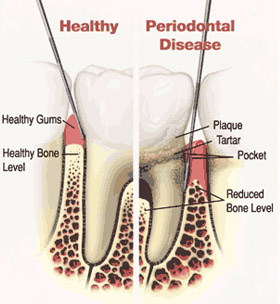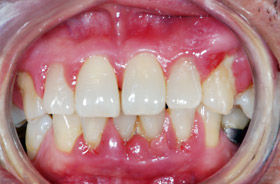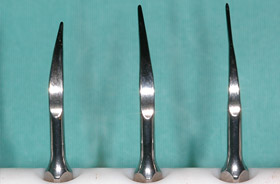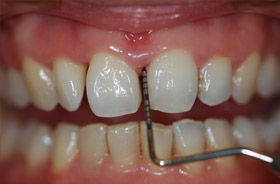Are all dental scalings the same? Why should we get regular scalings with a dentist even if we do not have a problem?
The gums and jaw bone form the foundation to hold our teeth in place. We need our teeth not only to maintain a healthy diet, to empower us with a socially acceptable smile as well as to ensure good health in general.
Decay (caries) and gum (periodontal) disease are the most common reasons people lose teeth and both can be prevented in most cases by removal of plaque.
What is plaque?

Plaque is that sticky, colourless film that constantly forms on your teeth. It is a film of bacteria and their by-products. It is like “moss” on wet ground and is not easily removed unless the correct way of brushing and flossing is implemented.
It sits beneath the gum line and hardens to become tartar if not removed within 3 days.
Gingivitis
At this stage the by –products of the bacterial plaque causes the gums to redden and bleed on brushing but otherwise the patient feels little pain if at all. This condition is called gingivitis and a recent survey done in Singapore indicates that more than 80% of the population show some signs of it.
Here’s why thorough scalings and good professional advice on the correct way to maintain good oral hygiene is important. If the plaque and tartar beneath the gum line are not removed 360 degrees around each and every tooth, it remains embedded in gums and depending on the immunity and disease threshold of the patient, periodontitis may occur.
What is periodontitis?

38 year old patient with periodontitis
The plaque spreads and grows below the gum line. Toxins or poisons produced by the bacteria in plaque invade the gums and eventually causes the bone that support the teeth to be destroyed. Gums separate from the teeth, forming pockets (spaces between the teeth and gums) that become infected. As the disease progresses, the pockets deepen and more gum tissue and bone are destroyed. Often, this destructive process has no or very mild symptoms. Eventually, teeth can become loose, move out of position or pus and swellings may develop. It is often at this late stage that the patient realizes something is wrong and seeks treatment. However, treatment may not be always successful at this stage.
So are scalings painful then as the dentist has to clean beneath the gums?

Slim tip on the extreme right
This depends on the pain threshold of the patient. In general though, thorough scalings are not painless but are easily tolerated by patients. This is also helped by technology as there are scaling ultrasonic tips that are slimmer than the norm and cause little pain when inserted beneath the gums. A thorough scaling will usually involve the use for ultrasonics as well as hand scalers followed by detailed oral hygiene instructions if needed.
Who are periodontists?
These are dental surgeons who specialize in the treatment of gum disease. They usually treat patients who already have lost bone support due to gum disease but do provide preventive gum care as well as gum checks to make sure there is no sign of gum disease in a concerned patient.
Get the maintenance your teeth and gums require to stay healthy!
Gum disease is SILENT till it’s too late and the teeth are loose. Hence, it oftens goes undetected as people ignore bleeding gums and occasional swellings as they believe it is due to heatiness. Also, unless dental Xrays and gum pocket measurements are taken, even dentists can be fooled into thinking patients are gum healthy. Below is an example.

